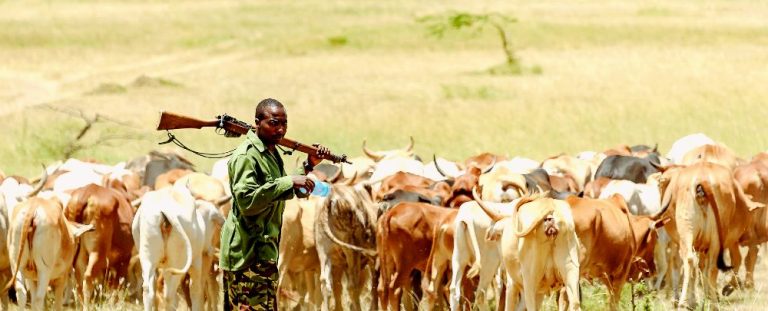Beyond Violence: Addressing the Complexity of Farmer-Herder Conflicts in West and Central Africa
A herder guarding his cattle in Kenya.
The surge in violence between farmers and herders in West and Central Africa has become one of the most pressing security challenges facing the region. With over 15,000 deaths linked to farmer-herder violence since 2010, half of which have occurred since 2018, the situation demands urgent attention. However, addressing this complex issue requires moving beyond simplistic narratives and recognizing the multifaceted drivers of conflict.
At its core, the escalation of farmer-herder tensions is rooted in growing competition over land and resources. As the rural population in the Sudano-Sahelian zone has increased by more than 40 percent over the past two decades, cropland has doubled, encroaching on traditional grazing areas. This land pressure has pushed herders into protected areas and increased their reliance on practices like tree branch lopping, often bringing them into conflict with security and forestry agents.
However, the problem goes beyond mere resource competition. Social inequalities, changing patterns of livestock ownership, and the erosion of traditional dispute resolution mechanisms have all contributed to the current crisis. In some areas, the shift in livestock ownership from rural pastoralist communities to wealthy urban dwellers has disrupted longstanding systems of mutual dependence between farmers and herders. This has been exacerbated by the breakdown of trusted dispute resolution institutions, often due to perceptions of corruption or bias.
The situation is further complicated by the involvement of militant Islamist groups, particularly in central Mali, northern Burkina Faso, and parts of Nigeria. These groups have instrumentalized intercommunal tensions to foster recruitment, conflating farmer-herder conflict with violent extremism. This has significantly muddied the security landscape, making it difficult to distinguish between local grievances and broader extremist agendas.
Addressing these challenges requires a nuanced, multifaceted approach. First and foremost, there is a need to differentiate between local grievances and armed extremist group activities in high-risk areas. Security forces must apply a discriminating approach in counterinsurgency efforts, protecting exposed communities while avoiding actions that could further alienate vulnerable populations.
Investing in improved land management infrastructure is crucial. This includes developing and maintaining maps and physical markers, as well as fostering community adherence to agreed-upon land regulations. Successful initiatives like RECOPA in Burkina Faso demonstrate the importance of involving a broad range of stakeholders – from traditional and religious leaders to civil society actors – in land governance decisions.
Training local leaders in dispute resolution techniques is another key strategy. By investing in mediation skills, communication dynamics, and cross-cultural competency, communities can rebuild trust and develop more effective mechanisms for resolving conflicts before they escalate into violence.
Perhaps most importantly, there is a critical need to build trust between communities and security forces. When local populations believe that security forces will respond quickly and impartially to outbreaks of violence, they are less likely to resort to extralegal actions. This requires developing mechanisms to increase the accountability and effectiveness of security forces, as well as improving their capacity for rapid response.
The farmer-herder conflict in West and Central Africa is a complex issue that defies simple solutions. However, by addressing the root causes of tension, improving land management practices, enhancing local dispute resolution capabilities, and fostering trust between communities and security forces, we can work towards mitigating this growing crisis. The stakes are high, but with concerted effort and a nuanced understanding of the problem, progress is possible.
-

Mali : Assimi Goïta s’octroie un mandat présidentiel illimité sans recours aux urnes
Rédaction : Sekou Kagné Le chef de l’État malien, le général Assimi Goïta, a officiellement promulgué une loi lui conférant un... Politique -

RDC : une plainte en Belgique visant des proches du président Tshisekedi suscite des controverses
Rédaction : Tendai Zola Une plainte a été déposée mardi à Bruxelles contre neuf membres du cercle familial du président congolais... Politique -

Côte d’Ivoire arrestation d’un député malien sur fond de crise entre les deux pays
Rédaction: fatima BabadinLes autorités ivoiriennes ont procédé à l’arrestation d’un représentant du Conseil national de transition du Mali à Abidjan,... Tendances Sécuritaires -

Sahel : sur des routes minées par la violence, chaque trajet peut être le dernier
Rédaction : Aminata Diallo Dans le centre du Mali, la nationale 15 serpente depuis la ville de Sévaré jusqu’à la frontière... Tendances Sécuritaires -

Le président ivoirien Alassane Ouattara entame une visite en France
Rédaction: Reda El GhazalLe chef de l’État ivoirien Alassane Ouattara a quitté Abidjan vendredi dernier, amorçant un séjour en France... Coopération régionale et internationale -

Sommet de la Confédération sahélienne prévu à Bamako en décembre
Rédaction: Reda El Ghazal Les dirigeants des pays membres de la Confédération sahélienne prévoient de se retrouver à Bamako en décembre... Afrique de l'Ouest - Sahel

 Suivez les dernières nouvelles sur WhatsApp
Suivez les dernières nouvelles sur WhatsApp  Suivez les dernières nouvelles sur Telegram
Suivez les dernières nouvelles sur Telegram  Suivez les dernières nouvelles sur Google News
Suivez les dernières nouvelles sur Google News  Suivez les dernières nouvelles sur Nabd
Suivez les dernières nouvelles sur Nabd 


















